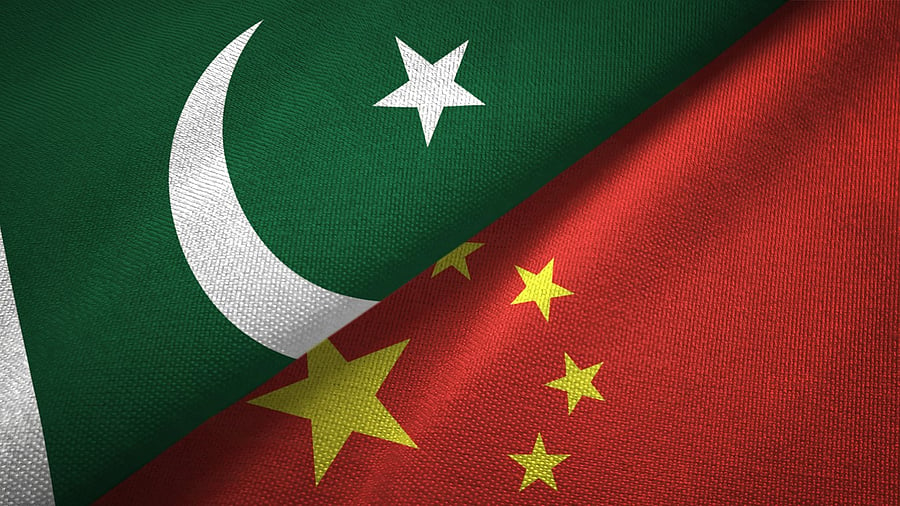
Representative image showing Pakistan and China's national flags.
Credit: iStock Photo
China has always described its ties with Pakistan as ‘higher than the mountains, and deeper than the oceans’. In tune with this, Beijing has also invested heavily in Pakistan.
The China-Pakistan Economic Corridor (CPEC), which is an important component of the Belt and Road Initiative (BRI), carries an investment plan of $62 billion. As per reports around 30,000 Chinese workers are employed in various BRI projects in Pakistan. However, these workers have been the target of multiple terrorist attacks. The most recent one was when two Chinese workers were killed in a bomb blast near the Karachi airport on October 6.
In a similar incident, five Chinese workers were killed in March. The Baloch Liberation Army (BLA) claimed the attacks. Pakistan’s Prime Minister Shehbaz Sharif called the act “heinous” and asserted that “Pakistan stands committed to safeguarding our Chinese friends”. A federal minister of Pakistan has even made claims that the upcoming protests in Pakistan are motivated by a neighbouring country or a ‘hum saya mulk’.
While the Chinese foreign ministry issued a statement saying, “Terrorism is a common enemy of humanity. The attempts of terrorist forces to undermine China-Pakistan trust and cooperation and the China-Pakistan Economic Corridor will not succeed. China will continue to support Pakistan’s counterterrorism effort, and stands ready to work with Pakistan to foil any attempt to sabotage China-Pakistan relations”.
Pakistan is also facing the brunt of increasing Chinese loans and mounting debt. Pakistan’s debt situation has become increasingly challenging for the government. As per reports, Pakistan owes around $26 billion in debt to China, out of which $16 billion is in the energy sector. Islamabad has also consistently requested Beijing to re-structure the loan as it is necessary if Pakistan wants to be considered for a bailout from the International Monetary Fund (IMF). It is not only Chinese investments but Beijing has also been crucial in repeatedly bailing out the ailing Pakistani economy in the last few years.
The repeated attacks on Chinese nationals have pushed Beijing to demand stringent measures from Islamabad to safeguard its investments and nationals. Most of the attacks have been undertaken by the BLA, which feels that the benefits of the investments are not being shared with the Baloch people. The consistent exploitation of the region for resources has also made the situation tense.
Reports suggest that Beijing is not happy with the capability of Pakistani armed forces and is considering stationing its personnel in Pakistan. As a show of intent to protect, Pakistan has added 45 billion Pakistani rupees, but China is keen on signing an anti-terrorism agreement. If the attacks continue it looks unlikely that Islamabad will be able to prevent the presence of Chinese military forces on its own soil, jeopardising its already fragile sovereignty.
These attacks are further challenging for Islamabad as it prepares to host the meeting of the council of heads of governments of the Shanghai Corporation Organisation (SCO), scheduled for October 15 and 16. Chinese Premier Li Qiang will attend the meeting. Such violent attacks on Chinese nationals will question Islamabad’s capability to safeguard foreign nationals as well as its suitability for an upcoming multilateral meeting.
External Affairs Minister S Jaishankar is scheduled to attend the SCO meeting. He has asserted that no bilateral talks with Pakistan will be undertaken, and has reaffirmed that terrorism is one of the major hurdles to improving relations. His United Nations General Assembly (UNGA) speech rings too true. During his speech, he hinted at China’s role when it comes to shielding Pakistan’s terrorist organisations from getting listed and blocked, and argued that such actions should “not be impeded for political reasons”.
In the same speech, he argued against the centrality of terrorism to Pakistan’s foreign and regional policies. He underscored that “Terrorism is antithetical to everything that the world stands for. All its forms and manifestations must be resolutely opposed. The sanctioning of global terrorists by the United Nations should also not be impeded for political reasons”.
India expressed similar sentiments towards Pakistan-sponsored terrorism during the SCO meeting at Astana in July. The Indian stand was “Many of us have had our experiences, often originating beyond our borders. Let us be clear that if left unchecked, it can become a major threat to regional and global peace”. Given the recent developments, one can argue that this is a looming reality too difficult to ignore.
The recent attacks on Chinese nationals in Pakistan redeem India’s stand. While Pakistan has been keen to protect them, its history of promoting terrorism cannot be ignored. The consistent and unquestioned support extended to Pakistan by Beijing has also helped terror groups grow and flourish. The recent attacks underscore that the threat is now directed towards China too.
These circumstances force one to ponder whether Beijing will undertake any concrete steps to curb these outfits, an act which is long overdue, and can greatly help in India-China thaw and lift Beijing’s international image. But this will definitely hurt the China-Pakistan ‘all-weather friendship’. Or, will Beijing continue with its policy of non-interference even when its nationals and investments are continuously targeted?
(Gunjan Singh is Associate Professor, OP Jindal Global University.)
Disclaimer: The views expressed above are the author's own. They do not necessarily reflect the views of DH.